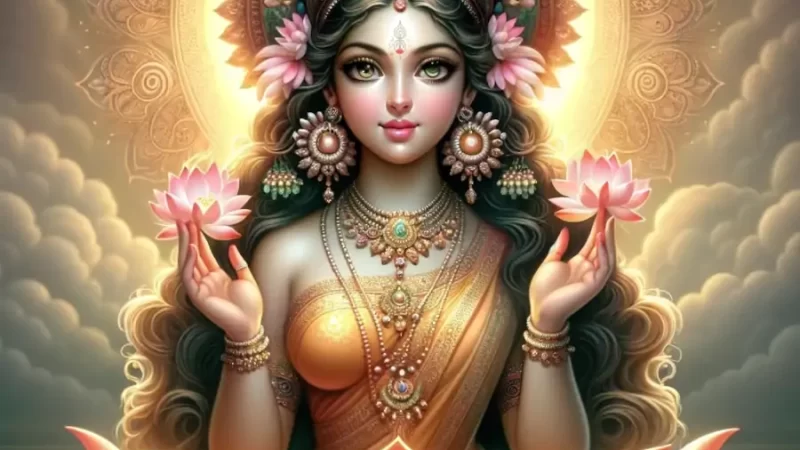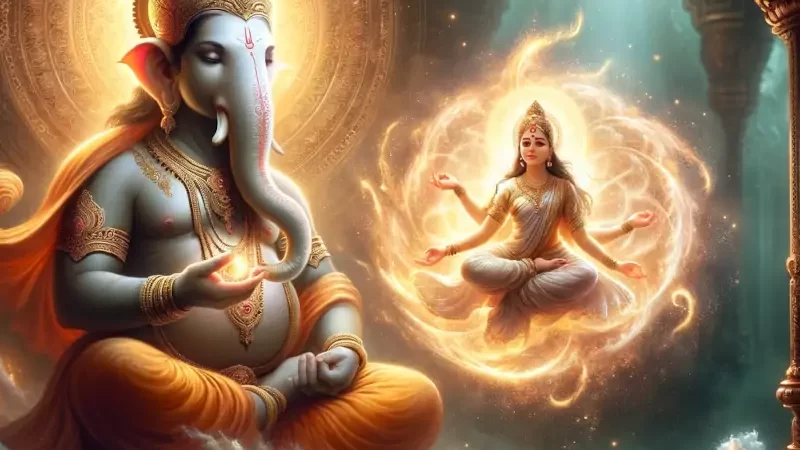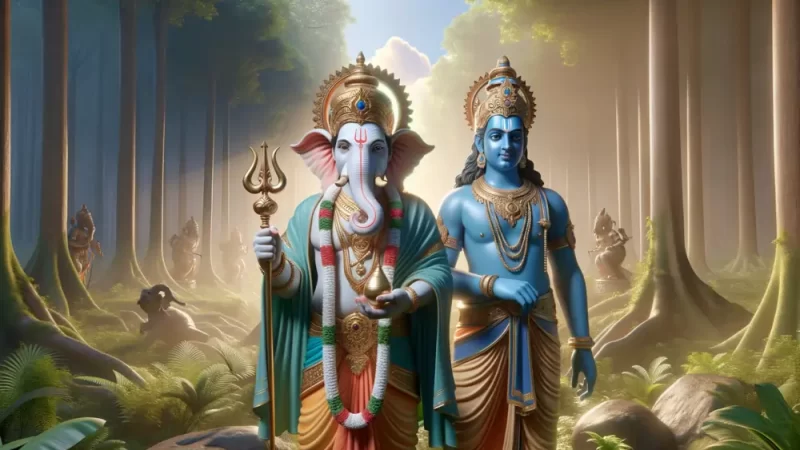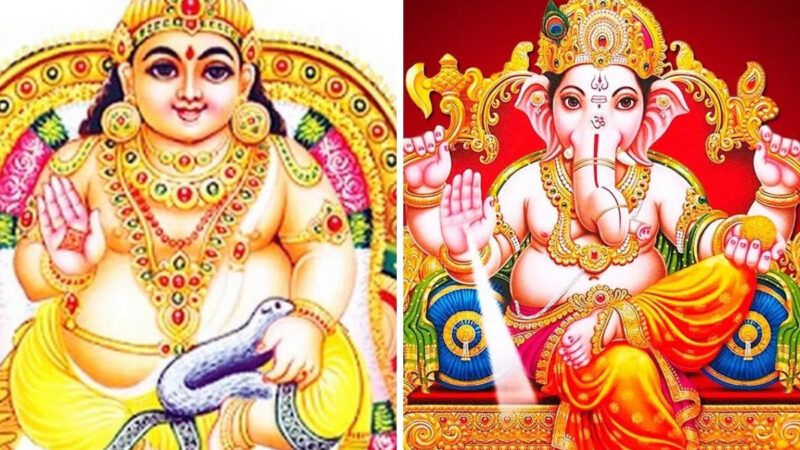Ganesha and Parashurama: Tale of Broken Tusk
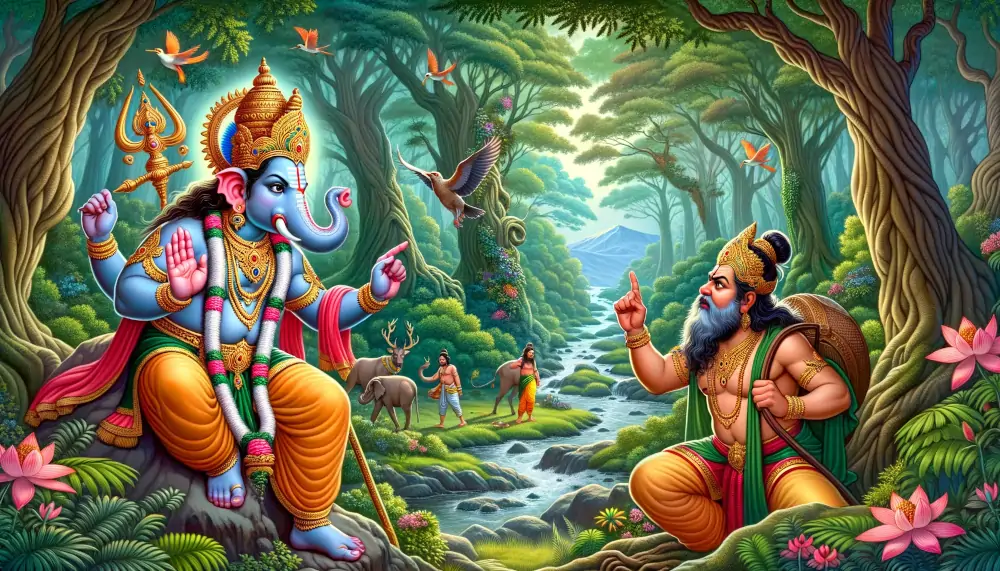
The Divine Boon
In the ancient times of gods and avatars, there lived a mighty warrior known as Parashurama, an incarnation of Lord Vishnu. His purpose was clear and unwavering—to eradicate the Kshatriya clan, who had inflicted countless atrocities upon the Earth. Parashurama’s path was one of destruction, a necessary act to restore balance to the world.
As he journeyed through his mission of retribution, Parashurama found himself in need of greater power. He sought the divine intervention of Lord Shiva, the destroyer of evil and the supreme deity of the Hindu pantheon. With unwavering devotion, he meditated upon the lord for days, his mind focused solely on his purpose.
Deeply moved by Parashurama’s unwavering commitment, Lord Shiva decided to test his devotee’s resolve. He appeared before Parashurama in all his divine glory, a sight that would humble even the mightiest of warriors. “Parashurama,” the lord spoke, “your devotion overwhelms me. Ask, and your request shall be granted.”
With humility and reverence, Parashurama beseeched the great Mahadeva, “O Lord of the Cosmos, bless me with a divine weapon, a weapon that can vanquish the evil forces that plague our sacred Earth.”
Lord Shiva, known for his generosity towards his devoted followers, smiled upon Parashurama. He reached out and placed a magnificent axe in the warrior’s hand. This was no ordinary axe; it was a divine weapon, a gift from the lord himself. It was named ‘Parashu’ in honor of the one who would wield it.
Grateful beyond words for this divine boon, Parashurama bowed before Lord Shiva and expressed his deepest gratitude. With the divine axe in his possession, he felt invincible, ready to fulfill his mission with renewed vigor.
The Journey to Kailash
Parashurama’s next step was to embark on a journey to Kailash, the sacred abode of Lord Shiva. He intended to pay his respects and seek the lord’s blessings before continuing his mission to eradicate the Kshatriya clan. With Parashu in hand, he set forth on this arduous pilgrimage.
However, what Parashurama did not know was that prior to his arrival, Lord Shiva had entrusted his loyal son, Ganesha, with the important duty of guarding the entrance to his divine abode. The great lord himself was deep in meditation, and he needed a guardian to ensure that no one disturbed his contemplation.
Ganesha, with his unwavering devotion and sense of duty, stood at the entrance to Kailash like an immovable sentinel. He was resolute in his duty and had been given clear instructions by his father to permit no one to enter during his meditation.
The Fateful Encounter
As Parashurama approached the sacred abode of Lord Shiva, his heart filled with reverence and anticipation. He had heard of the sanctity of Kailash and the divine presence of the lord. His steps were measured and respectful as he reached the entrance, where Ganesha stood guard.
Politeness and humility were virtues deeply ingrained in Parashurama, but his singular purpose sometimes led to a certain impatience. He addressed Ganesha with respect, “O guardian of Kailash, I am Parashurama, a devoted servant of Lord Shiva. I seek entry to pay my respects to the lord.”
Ganesha, ever faithful to his duty, replied with utmost politeness, “I regret to inform you that I am instructed not to allow anyone inside while my father meditates. Please wait patiently, for the lord’s meditation shall soon come to an end.”
Parashurama’s impatience began to smolder within him. He had a divine weapon bestowed upon him by Lord Shiva himself, and he believed he should be granted immediate access. In his mind, the urgency of his mission outweighed all else.
In the heat of the moment, Parashurama’s patience wore thin, and he let his anger get the best of him. He had come to Kailash with reverence, but now frustration clouded his judgment. He said, “I cannot afford to wait. My mission is of utmost importance, and I carry a divine axe bestowed upon me by Lord Shiva. I must enter.”
Ganesha, unyielding in his duty, replied, “I understand the importance of your mission, but my father’s meditation is sacred, and I cannot allow anyone to disturb it.”
The Divine Clash
The exchange between Parashurama and Ganesha escalated quickly. Fueled by his impatience and anger, Parashurama could not comprehend the unwavering devotion and duty that Ganesha held for his father. In a moment of frustration and fury, he made a decision that would have far-reaching consequences.
Parashurama raised the divine axe, high above his head and swung it towards Ganesha. The clash of divine energies echoed through the hallowed grounds of Kailash as the axe struck Ganesha in the face. The impact was profound, and it resulted in the loss of one of Ganesha’s tusks.
The sound of the collision reached the ears of Lord Shiva, who was deep in meditation with Goddess Parvati by his side. Sensing the disturbance, they opened their eyes and swiftly appeared at the scene.
A Father’s Fury and a Son’s Forgiveness
As Lord Shiva and Goddess Parvati arrived, they were met with a scene of turmoil and conflict. Ganesha stood, wounded and bleeding, while Parashurama realized the gravity of his actions. Regret and remorse washed over him as he recognized the consequences of his impulsive anger.
Parashurama, his head bowed in shame, approached Lord Shiva and Goddess Parvati. He spoke with profound remorse, “Forgive me, O Lord and Mother of the Universe, for my hasty and impulsive actions. I did not realize that this guardian of Kailash was your beloved son, Ganesha. I am deeply sorry for the harm I have caused.”
Ganesha, despite the pain he endured, displayed remarkable grace and magnanimity. He turned to Parashurama and spoke with kindness, “Parashurama, I understand that the axe that struck me was a gift from my father. I consider it an honor to bear this injury for the sake of your mission. I bless you for success in your endeavor to eradicate evil forces on Earth.”
Lord Shiva, who had witnessed the entire incident, was both a father and the supreme lord of the universe. His fury at seeing his beloved son injured was immense, but he also recognized Parashurama’s remorse and Ganesha’s capacity for forgiveness. He spoke, his voice echoing with divine authority, “Parashurama, you have committed a grave mistake, but your remorse and Ganesha’s forgiveness have moved me. I grant you my blessings for success in your mission.”
Goddess Parvati, who always embodied compassion, added, “May this incident serve as a lesson in humility and the consequences of impulsive actions. Let it be a reminder that even in the face of adversity, forgiveness and grace can prevail.”
A Testament to Duty and Forgiveness
The tale of how Ganesha lost one of his tusks at the hands of Parashurama serves as a profound testament to several aspects of Hindu mythology. It highlights Ganesha’s unwavering commitment to his duties as a guardian and his capacity for forgiveness, even in the face of adversity. Ganesha’s willingness to bless Parashurama despite the injury inflicted upon him demonstrates the values of compassion and magnanimity.
Parashurama’s impulsive actions and subsequent remorse showcase the human tendency to let anger and impatience cloud judgment. However, his sincere regret and Lord Shiva’s blessings remind us that redemption and forgiveness are attainable, even after grave mistakes.
Ultimately, this tale reflects the intricate interplay of devotion, duty, forgiveness, and divine intervention that are central to Hindu mythology. It serves as a timeless reminder that in the realm of gods and mortals, even the most profound conflicts can find resolution through understanding, forgiveness, and grace.


